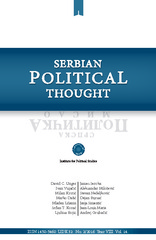Media addiction and political participation in Serbia
Чланак у часопису (Објављена верзија)
Метаподаци
Приказ свих података о документуАпстракт
Appearance of the Internet and its spread to 38.8% of world population
from 1995 to 2013 indicate that new media bring significant changes to societies
around the world. Features of new media such as interactivity and possibility
to use it from anywhere anytime indicate the Internet may be highly addictive.
Data point to increases in overall media use over the last 60 years. On the other
hand, decreases in political participation are registered together with decline in
socializing and active membership in professional organizations for the same
period. Research is conducted through nationally representative survey in Serbia
during 2013. All hypotheses of this study have been confirmed including
main one, saying that increases in media addiction cause decreases in political
participation. Those who have less confidence in future are bigger media addicts,
those who fear about present and future are bigger media addicts, those
who are not interested in politics are bigger medi...a addicts, those who have less
political knowledge are bigger media addicts and finally that low participants
in elections are bigger media addicts. This study is limited to Serbia, while it
would be useful to measure media addiction in all countries. New methodology
introduced by this study should be improved. Results of further studies should
be presented with 3D graphs.
Кључне речи:
political participation / media addiction / new media / democracy / the Internet / digilabИзвор:
Serbian political Thought, 2016, 14, 2, 171-181Издавач:
- Belgrade: Institute for Political Studies
Колекције
Институција/група
IFDTTY - JOUR AU - Bojić, Ljubiša AU - Marie, Jean-Louis PY - 2016 UR - http://rifdt.instifdt.bg.ac.rs/123456789/2345 AB - Appearance of the Internet and its spread to 38.8% of world population from 1995 to 2013 indicate that new media bring significant changes to societies around the world. Features of new media such as interactivity and possibility to use it from anywhere anytime indicate the Internet may be highly addictive. Data point to increases in overall media use over the last 60 years. On the other hand, decreases in political participation are registered together with decline in socializing and active membership in professional organizations for the same period. Research is conducted through nationally representative survey in Serbia during 2013. All hypotheses of this study have been confirmed including main one, saying that increases in media addiction cause decreases in political participation. Those who have less confidence in future are bigger media addicts, those who fear about present and future are bigger media addicts, those who are not interested in politics are bigger media addicts, those who have less political knowledge are bigger media addicts and finally that low participants in elections are bigger media addicts. This study is limited to Serbia, while it would be useful to measure media addiction in all countries. New methodology introduced by this study should be improved. Results of further studies should be presented with 3D graphs. PB - Belgrade: Institute for Political Studies T2 - Serbian political Thought T1 - Media addiction and political participation in Serbia IS - 2 VL - 14 SP - 171 EP - 181 UR - https://hdl.handle.net/21.15107/rcub_rifdt_2345 ER -
@article{
author = "Bojić, Ljubiša and Marie, Jean-Louis",
year = "2016",
abstract = "Appearance of the Internet and its spread to 38.8% of world population
from 1995 to 2013 indicate that new media bring significant changes to societies
around the world. Features of new media such as interactivity and possibility
to use it from anywhere anytime indicate the Internet may be highly addictive.
Data point to increases in overall media use over the last 60 years. On the other
hand, decreases in political participation are registered together with decline in
socializing and active membership in professional organizations for the same
period. Research is conducted through nationally representative survey in Serbia
during 2013. All hypotheses of this study have been confirmed including
main one, saying that increases in media addiction cause decreases in political
participation. Those who have less confidence in future are bigger media addicts,
those who fear about present and future are bigger media addicts, those
who are not interested in politics are bigger media addicts, those who have less
political knowledge are bigger media addicts and finally that low participants
in elections are bigger media addicts. This study is limited to Serbia, while it
would be useful to measure media addiction in all countries. New methodology
introduced by this study should be improved. Results of further studies should
be presented with 3D graphs.",
publisher = "Belgrade: Institute for Political Studies",
journal = "Serbian political Thought",
title = "Media addiction and political participation in Serbia",
number = "2",
volume = "14",
pages = "171-181",
url = "https://hdl.handle.net/21.15107/rcub_rifdt_2345"
}
Bojić, L.,& Marie, J.. (2016). Media addiction and political participation in Serbia. in Serbian political Thought Belgrade: Institute for Political Studies., 14(2), 171-181. https://hdl.handle.net/21.15107/rcub_rifdt_2345
Bojić L, Marie J. Media addiction and political participation in Serbia. in Serbian political Thought. 2016;14(2):171-181. https://hdl.handle.net/21.15107/rcub_rifdt_2345 .
Bojić, Ljubiša, Marie, Jean-Louis, "Media addiction and political participation in Serbia" in Serbian political Thought, 14, no. 2 (2016):171-181, https://hdl.handle.net/21.15107/rcub_rifdt_2345 .



